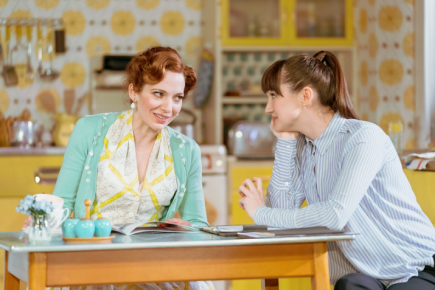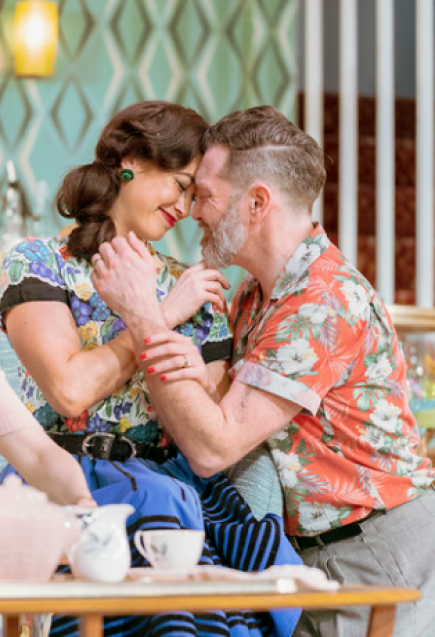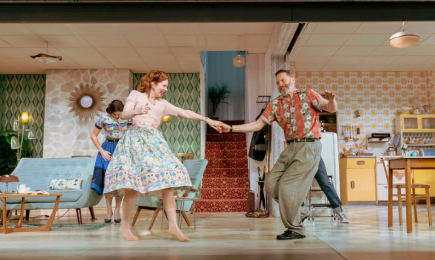Petticoats, pastel-coloured kitchens and Mr Sandman on the radio; from the opening scene, you’d be forgiven for thinking that Laura Wade’s newest play was set in America’s swinging 1950s. You would, however, be wrong.
At first glance, Home, I’m Darling – now playing at The Lowry, Salford – is an amusing, bubblegum-shaded play about one modern woman’s desire to style herself into the perfect Fifties housewife. Judy – played by the incomparable Katherine Parkinson (The IT Crowd, Humans) – wears candy-caned full skirts, keeps her house spick and span, and is at her husband, Johnny’s, beck and call to cater to his every whim.
We as the audience soon learn, however, that we are in fact in the 21st-century, and Judy’s fetish for all things retro extends to every aspect of her life, including its gender roles. She has left her job – one that was better paying than that of her estate agent husband– to fully commit to being a stay-at-home wife. Her purpose seems solely to strive to be a traditional doting homemaker for her bread-winning husband.
And to a certain level, Judy presents this persona fairly convincingly. The cheery, happy-go-lucky smile that is pasted onto her face masks the anxiety that is ever bubbling under the perfectly powdered surface.

Katherine Parkinson plays this role extremely well; Judy’s character is both enchanting and deeply unsettling. Here we see a 21st-century woman, who was raised by a feminist mother and had a successful, high paying job, give it all up. Instead, she retreats into what appears to be a self-made prison, albeit one decorated in gingham and polka dot and served with sickly sweet cakes and cocktails.
Judy’s mother Slyvia, played by Susan Brown, puts a firm buffer up to this idea of the subservient wife. An actively politically feminist, she raised Judy in a commune and is on hand to remind her daughter that actually living in the past looked a lot different to what you see through rose-tinted glasses. Brown’s monologue is a definite highlight.
The passion with which she desperately tells her daughter that her nostalgic outlook is totally false is actually quite moving. The real Fifties were full of “grey meat, grey people, everything grey,” she exclaims.
While the audience will probably align more with the mother’s disapproval of Judy’s lifestyle choices, the play does a great job at questioning our opinions. How much, for example, is Judy’s decision to retreat into an era with clear-cut roles and social expectations a rebellion against her out-of-the-norm upbringing?

Importantly too, questions around feminism are made centre stage. If Judy is truly choosing to live her life in this way, regardless of how oppressive this looks to the outside world, is she not exercising her rights to live as she chooses? It’s dilemmas like this that constantly rear their head throughout the performance.
On another note, Jo Stone-Fewings is great as Judy’s husband Johnny, another initial lover – or perhaps accomplice is a better word – of Judy’s descent into the world of the swinging Fifties. The dialogue between the couple hits every note with the humour in Wade’s script landing just as well as the more sentimental moments.
Siubhan Harrison and Hywel Morgan are a great contrast to the main couple as the all-singing, all-dancing best friends Fran and Marcus. They also enjoy a love of the Fifties but channel it more as a hobby than a fetish like Judy and Johnny.
The scene between Marcus and Judy is excellent and very timely, given the recent #MeToo movement. Thankfully, even Judy seems ready to leave a boss’s power to sexual harass his employees firmly in the past and Morgan’s villainous Marcus plays this role spot on.

Additionally, Anna Fleischle makes set designing look effortless. Every detail has been made to each piece of furniture and decoration to make the two-storey cutaway set fit perfectly into the 1950s era. And, notably the set changes are entertaining in themselves, thanks to Marcus and Fran’s lively dance performances.
Home, I’m Darling recently took home the Olivier award in the Best New Comedy category and it is easy to see why. The entire cast emphasise every detailed delight and twist in Wade’s script and the result is a really playful and enjoyable experience.
However, it was the more poignant parts after the interval when Judy’s Fifties dream starts to crumble that really rounded the whole story for me. The desperation from both Judy and her despairing loved ones were expertly performed and genuinely touching.
All in all, Home I’m Darling is excellent. Wade’s analysis of gender roles, feminism and even the Instagram-generation’s obsession with all things retro come under the microscope.
You are left with the timely reminder, that every scene you see that looks “deliciously, appallingly happy” on the outside, is in fact most likely a façade.
*Home, I’m Darling is showing at The Lowry, Salford until Saturday, April 27. You can buy tickets HERE.



